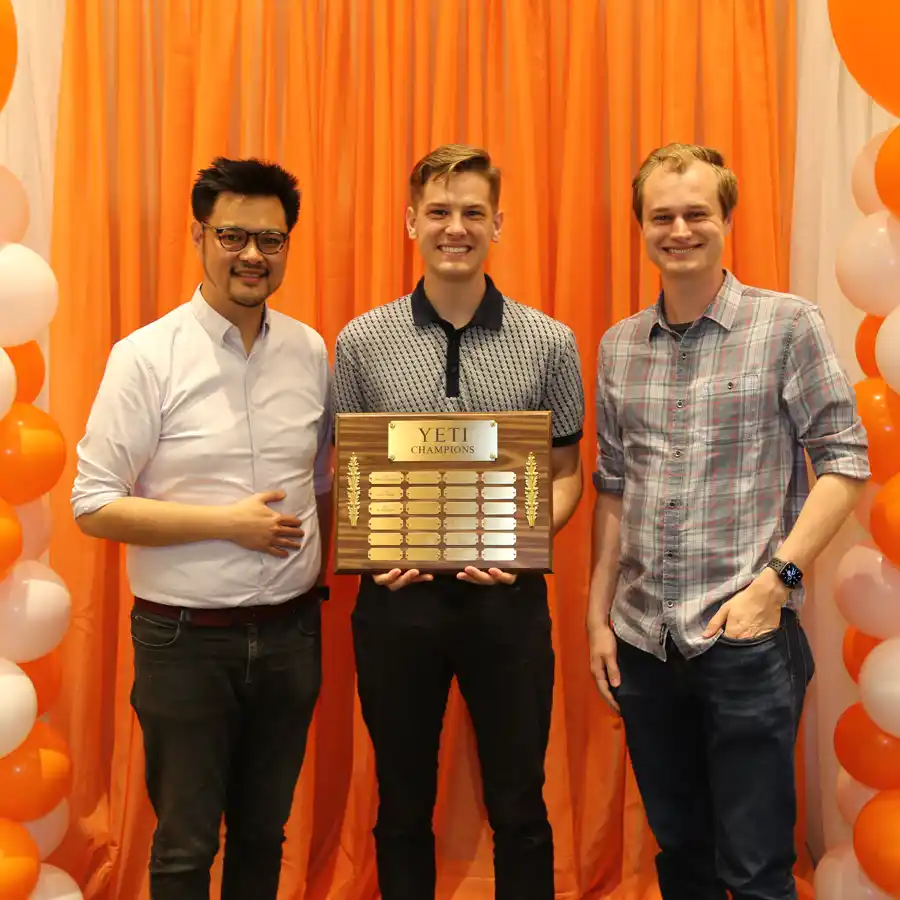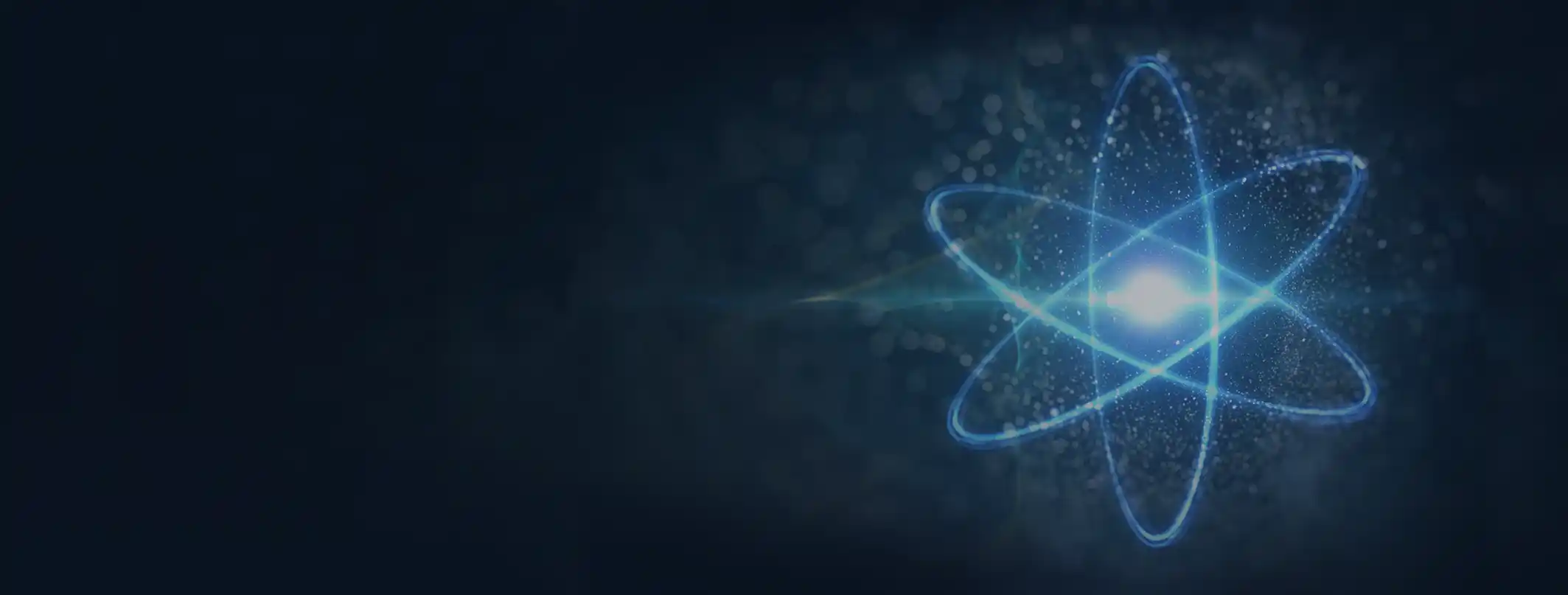Honors Day Awards 2024
On May 6 the department hosted our annual Honors Day celebration to recognize outstanding students, faculty, and staff. Professor and Department Head Adrian Del Maestro welcomed guests and shared highlights from the department’s banner year: multiple distinguished awards and fellowships for our faculty and students, 33 graduates for 2023-2024, and milestones like passing the comprehensive exam (a feat 24 students have accomplished in the past year). Physics has a lot to celebrate! Many thanks to Assistant Professor Larry Lee for presenting the undergraduate awards and Professor Norman Mannella for presenting the graduate honors. Read more about our amazing awardees below, and see the photo album at the bottom of the page.
Extraordinary Departmental Service Awards
This award goes to staff members who’ve gone above and beyond their job descriptions to keep the department moving in the right direction. This year the department honored Josh Bell (Machine Shop Supervisor) and Debra Johnson (Business Manager). They were cited “for stepping up and taking over leadership of their respective areas (Machine Shop and Business Office), resulting in a seamless transition and continual excellent service in support of the department’s teaching, research, and service mission.”
Outstanding First Year Student Award
This award recognizes exceptional achievement by a student in the first year of physics study. The faculty considers traditional first-year students enrolled as physics majors as well as transfer students who are in their first year at UT.
This year we were fortunate to recognize three extraordinary students with this honor: Austin Miller, Amelia Sandoval, and Jordan Ashley.
While they have distinguished themselves academically, they also bring enthusiasm, discipline, and diligence to their coursework. They are off to a great start in physics.
Robert Talley Awards
The Talley Awards are made possible by the late Robert Talley, a UT Physics master’s and PhD graduate and a distinguished alumnus honoree.
The first award (for Outstanding Undergraduate Research) goes to a student who has demonstrated a talent for solving problems through physics theory and/or experiment. Charles Bell has worked across theory, phenomenology, and experiment. One of his recent successes was helping visualize a particle detector in the game creation system Unreal Engine. He jumped into an incredibly daunting and unfamiliar framework and took the first steps into rendering these detectors in Unreal. The renderings that came out of this work have since been used in a recent issue of Science, including on the cover. This summer he’ll start graduate studies at the University of Michigan, working on the ATLAS Experiment at CERN to continue his particle physics research. He has earned a prestigious NSF graduate fellowship to support his work.
The second Talley Award recognizes Outstanding Undergraduate Leadership and goes to a student who has made significant contributions to the department outside the classroom, adding depth to our programs and encouraging interest in physics. Jordan Ashley spent time in the workforce before pursuing an undergraduate degree and joined the department as a transfer student. She’s been working in the particle physics group to perform a reinterpretation of an ATLAS search for displaced leptons in an R-parity violating supersymmetry context. She has written her own analysis code, helped merge everything into a GitHub project, and established a workflow for shared usage. She’s developed a fully working setup for event generation and compared results to those from the original paper. She’s working on scaling this up for large amounts of input data. Jordan also represented the department on a high energy physics lobbying trip to Washington, DC.
James W. McConnell Award for Academic Excellence
A bequest from UT graduate James W. McConnell established this Physics Excellence Endowment, resulting in $1 million in gifts to the physics department. The McConnell Award recognizes students who have senior standing and who have demonstrated outstanding performance in academic coursework.
Fredrick (John) Melhorn is a Chancellor’s Honors Scholar who has balanced rigorous coursework with research, including work for his honors thesis. His primary focus is on machine learning applications for direct photon classification in calorimeter clusters, which he tackled with enthusiasm and dedication. He exceeded expectations by delivering a fully functional Convolutional Neural Network model and a streamlined workflow for preprocessing physics data within a week. His proactive approach to learning and problem-solving has been evident throughout the research process, and he has consistently surpassed the goals set for him. He has also excelled in writing-intensive honors classes, building a strong academic record over his undergraduate career.
Douglas V. Roseberry Distinguished Upper Class Major Award
Douglas Roseberry loved physics and extracurricular activities inside and outside the department. He planned to attend graduate school at Princeton when he died unexpectedly in October 1959. In 1960, the department awarded the first Roseberry Award to honor a student with similar gifts and enthusiasm for research, academics, and leadership. The Roseberry Award is the department’s most distinguished undergraduate honor.
Taylor Sussmane has excelled in academics, research, and community service. She spearheaded the effort to revitalize our department’s Women in Physics group after a long hiatus. This group has sprung back to life with active meetings and membership, with support for women across the department. She worked in heavy ion physics before moving to the Compact Muon Solenoid experiment at CERN, studying possible new particles produced in the collisions of the Large Hadron Collider. With collaborators from UT and the University of Chicago, she led analysis that sets new unique constraints on such new particles, and remains one of the strongest limits to date in a particle region of model space. Next up, she’ll be a proud UT alumna when she continues her studies as a PhD student at the University of Wisconsin, Madison, working in experimental particle physics at the LHC.
Outstanding Graduate Teaching Assistant Awards
This year we recognized three outstanding Graduate Teaching Assistants for their fine work in the undergraduate physics labs.
Nico Braukman taught PHYS 221 and 222 this past year, inspiring student comments including: “Nico was one of the best TAs I have ever had. Very positive, helpful, and insightful. Made the material much more understandable.” And: “Nico was so helpful and kind throughout the semester! No matter how silly or ridiculous my questions were in lab, they were always kindly answered.”
Ryan Elder was a GTA for PHYS 231 this year, earning student evaluations such as: “Ryan was a great TA and his explanations were very helpful. He created a positive and unique lab environment that challenged me to critically think about how I gauge how well I understand the material.” And: “(Ryan) did a great job explaining concepts and clearly knew what was going on. He made a more fun learning environment by being friendly and approachable. Even when I’d be having a bad day, he always showed that he cared and was willing to offer help.”
Amber Stinson is an astronomy GTA whose student evaulations outlined how she is very good at running and teaching lab. One student wrote: “I was never confused during her explanations of labs, and she was always willing to help if I was stuck on any portions of the labs. She was very kind when helping other students.”
Wayne Kincaid Award
Wayne Kincaid was a UT Physics alumnus who later worked as a research associate in the department. He devoted his energy to developing tools that would make learning engaging and accessible for students at all levels. The department established this award to honor his legacy by recognizing a student who shares his love for astronomy and astrophysics education.
Jordan Jubeck is one of two leads for the telescope labs we host for undergraduate students. In presenting the Kincaid Award, Sean Lindsay, senior lecturer and astronomy coordinator, described how she created an Astronomy Telescope Labs website that provides status updates on if the rooftop will be open, gives weather forecasts, and houses an archive of astrophotography taken from our rooftop observing platform. She has also been a tremendous and enthusiastic driver of astronomy education outreach, helping out with events at local schools, community groups, and our own solar (eclipse) and night sky observing events. She also runs much of our planetarium-based outreach programming.
Stelson Fellowships
Paul Stelson finished a PhD at the Massachusetts Institute of Technology when he was 23. He worked for MIT and then joined Oak Ridge National Laboratory as a nuclear physicist, eventually becoming Director of the Physics Division. Dr. Stelson especially enjoyed interacting with young physicists, serving as an adjunct professor in the physics department for nearly 30 years. His family established the Stelson honors in his memory to assist aspiring physicists in completing their education.
Each year we recognize two students at Honors Day with Stelson Fellowships. The first of these is for Professional Promise. Abhyuday Sharda began in our department as a teaching assistant, helping new graduate students adjust to the job by sharing all his notes and lab writeups from previous years. He then moved into research on XEM2 experiments at Jefferson Laboratory. He threw himself into data analysis, assembling needed resources, asking the right questions, and sharing everything he learns with his peers. He knows how to calibrate multiple spectrometer detectors, has done several efficiency studies, and recently obtained EMC results for several isoscalar nuclei. He has developed analysis code, collaborated with experts on detector calibrations and analysis techniques, and built life-long relationships with his peer cohort.
The Stelson Fellowship for Outstanding Beginning Research recognizes a student for outstanding progress early in their research. Johnny Lawless has been tackling problems, learning new skills, and producing results since he first joined the graduate program. He spent a summer at Fermilab working with a team doing test beam characterizations of a Compact Muon Solenoid tracker upgrade component. He quickly became a lead on that project, driving the result with his enthusiasm, curiosity, and hard work. He has since jumped into the world of Large Hadron Collider data analysis and Machine Learning for high dimensional input space problems. On top of his personal research contributions, he goes above and beyond to help train the large number of undergraduates to ensure success across the UT CMS group.
Fowler-Marion Outstanding Graduate Student Award
Joseph Fowler was part of Oak Ridge National Laboratory’s Physics Division and also taught physics courses and conducted research at UT. With his colleague Jerry Marion he co-authored the textbook Fast Neutron Physics. They donated the royalties to the department, where the funds helped establish an award recognizing a graduate student who has excelled in scholarship, research, and departmental citizenship.
Harini Radhakrishnan has consistently excelled in all these areas. She has three published papers, (one as first author) with another important first author paper in the final manuscript preparation stage. She works to understand entanglement in condensed matter, including a paper that provides new insights into particle entanglement and will yield new tools able to diagnose the generation of exotic quasiparticles in and out of equilibrium. Her research contributes to a better understanding of how quantum statistical mechanics emerges from unitary time evolution in closed quantum systems, with implications for statistical, condensed matter, ultra-cold atom, and quantum information physics. Harini has contributed greatly to the department’s community, serving as president and vice president of the Graduate Physics Society. She also advised high school students as part of UT’s Upward Bound Program and helped create the Individual Development Plan our students now use.
Faculty Honors
Honors Day offers the department an opportunity to recognize exceptional faculty contributions to teaching and research mentorship. The undergraduates select two awardees through the Society of Physics Students and the graduate students do the same through the Graduate Physics Society. This year’s honorees are:
Society of Physics Students Teacher of the Year Award: Assistant Professor Sherwood Richers
Society of Physics Students Research Advisor of the Year Award: Professor Michael Guidry
Graduate Physics Society Teacher of the Year Award: Professor Anthony Mezzacappa
Graduate Physics Society Research Advisor of the Year Award: Assistant Professor Larry Lee
Sigma Pi Sigma Inductees
Sigma Pi Sigma is the physics honor society. UT’s chapter began in 1954 with Alvin Nielsen among the inaugural members. The society’s four dimensions are service, encouragement, honor, and fellowship. This year we welcomed the following student’s into our chapter:
Joesph Beller
Raghav Chari
Hugh Jones
Amanda Nowicki
Nolan Robertson
James Rogers
Alexander Sizemore
YETI Awards
Assistant Professors Tova Holmes and Larry Lee created the Year End Tournament of Imagination (YETI) in 2022 as an engaging challenge where players analyze data to solve puzzles, unlocking more clues to reveal fun facts. This year the department recognized the tournament champions at Honors Day, where we acknowledged the four finishers: Jordan O’Kronley, Sanket Sharma, Micah Hillman, and Rebecca Godri. Claiming the year’s honors by category were:
Very Delightful: Rebecca Godri
Very Interactive: Jordan O’Kronley
Overall winner: Micah Hillman
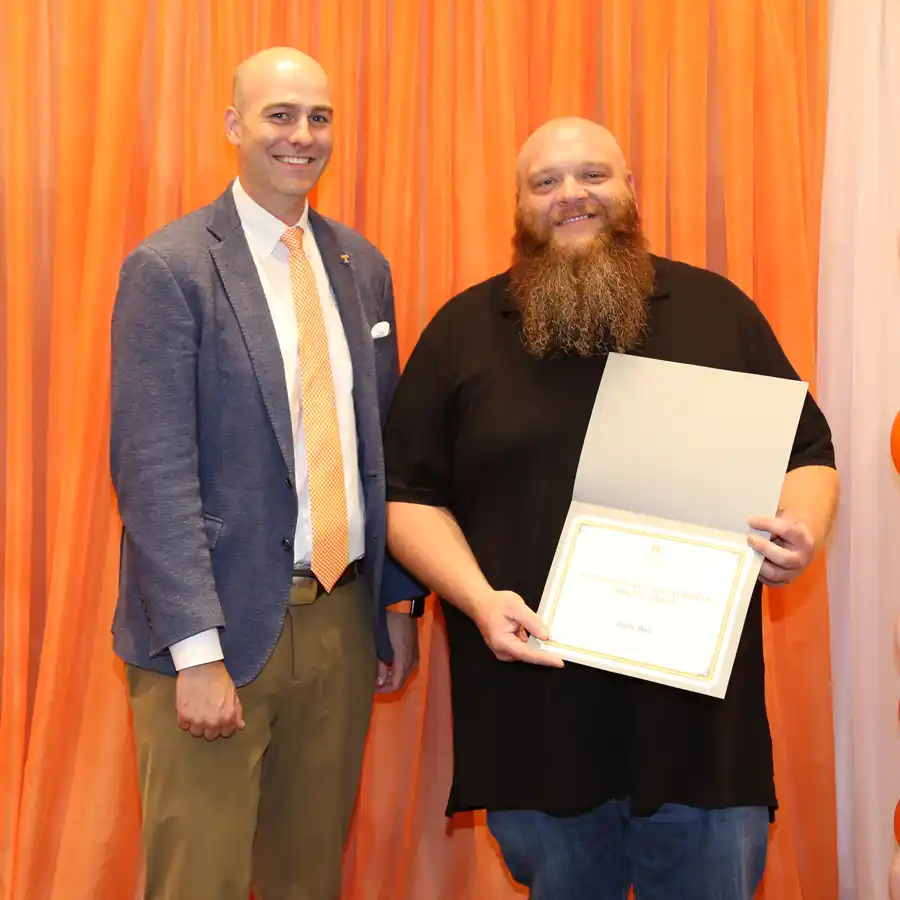
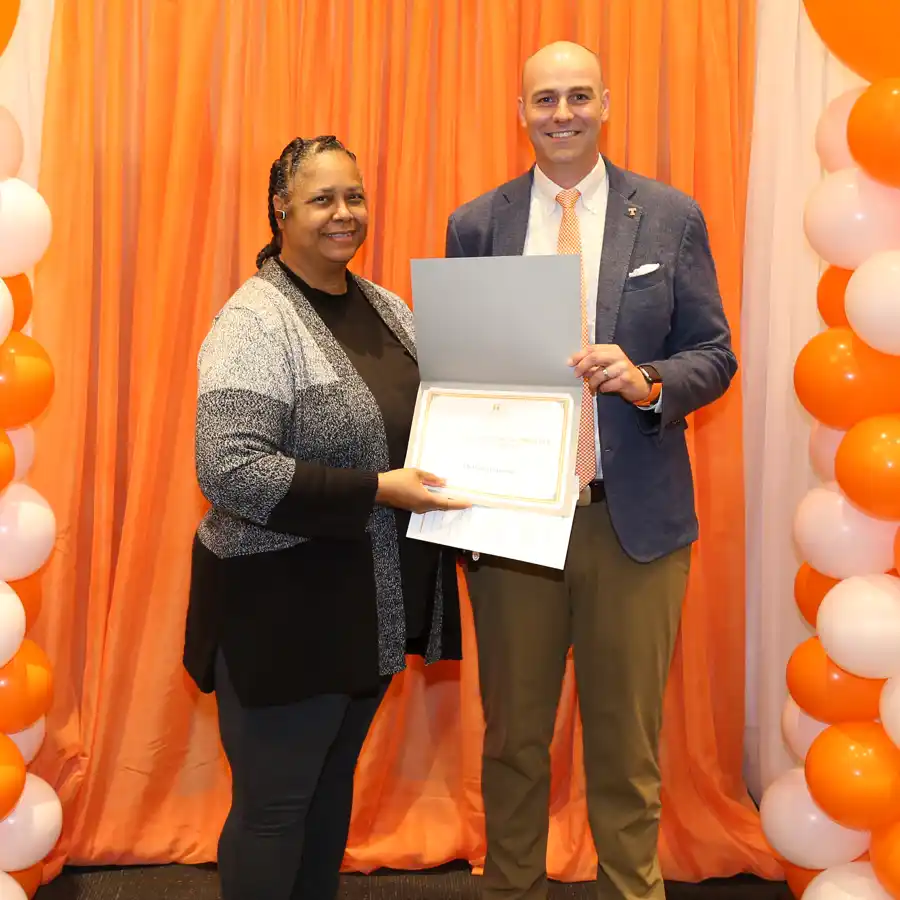
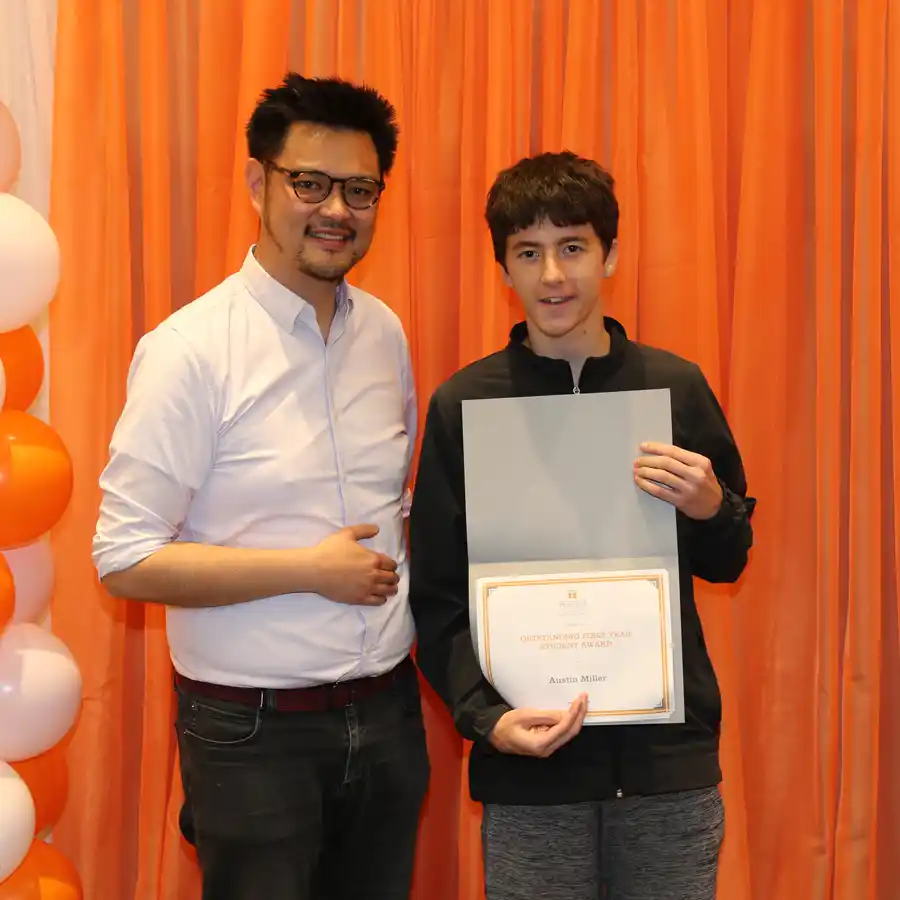
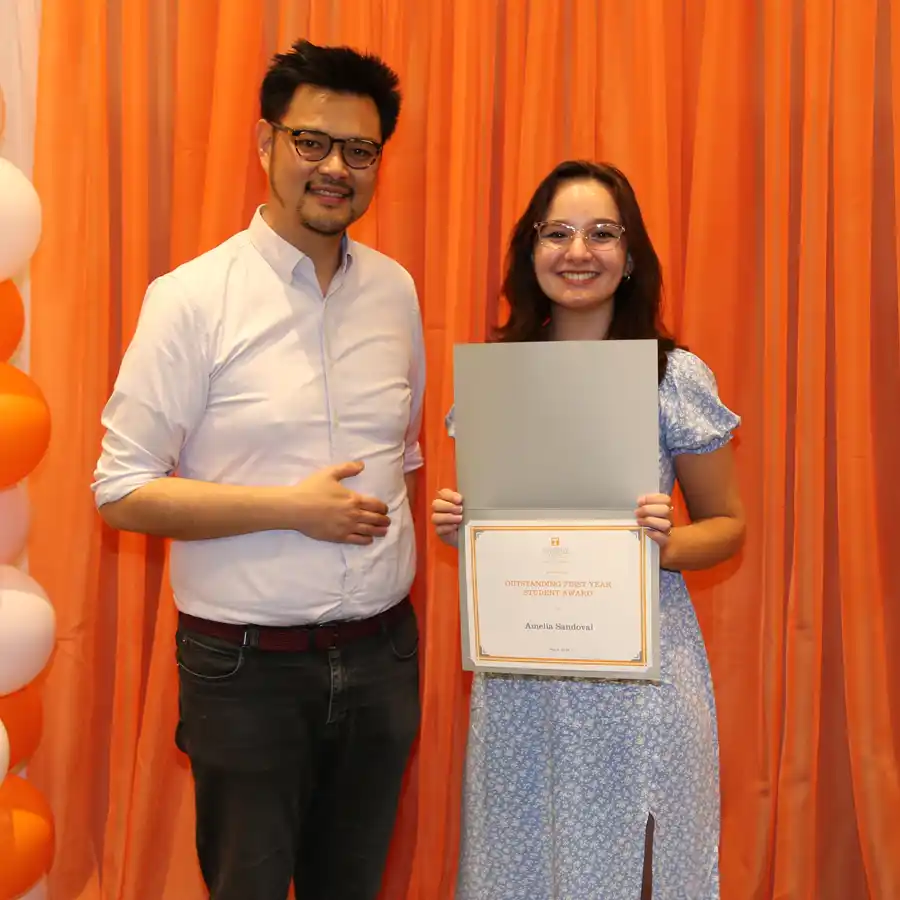
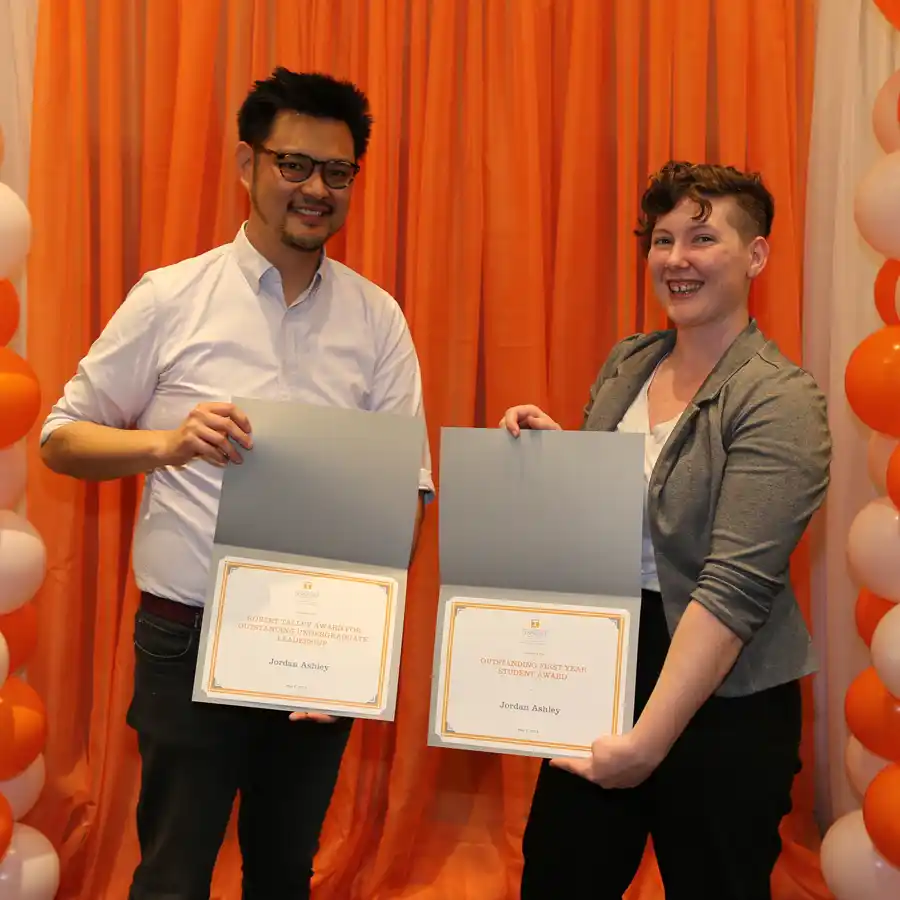
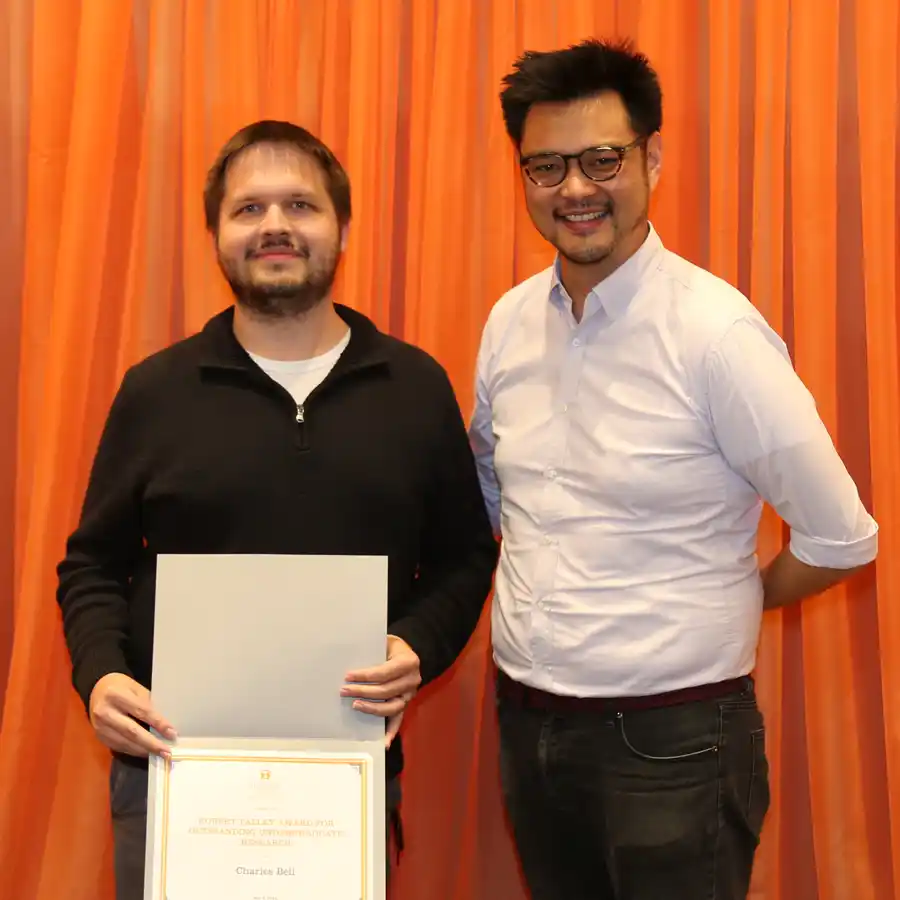
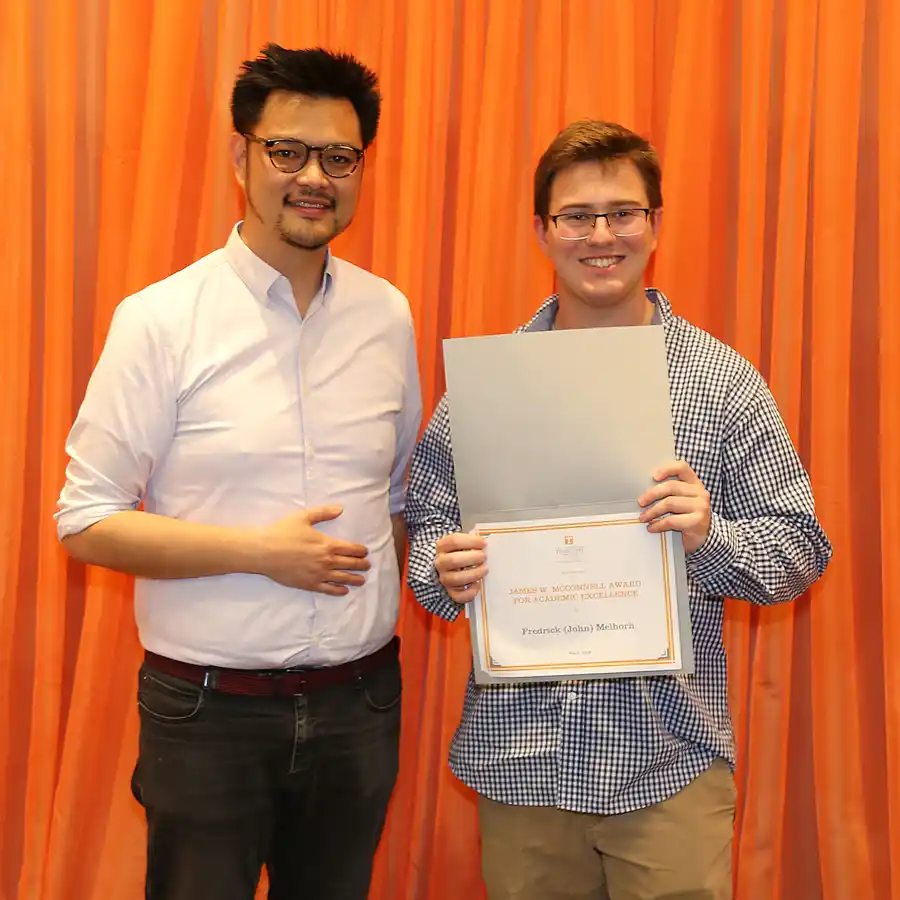
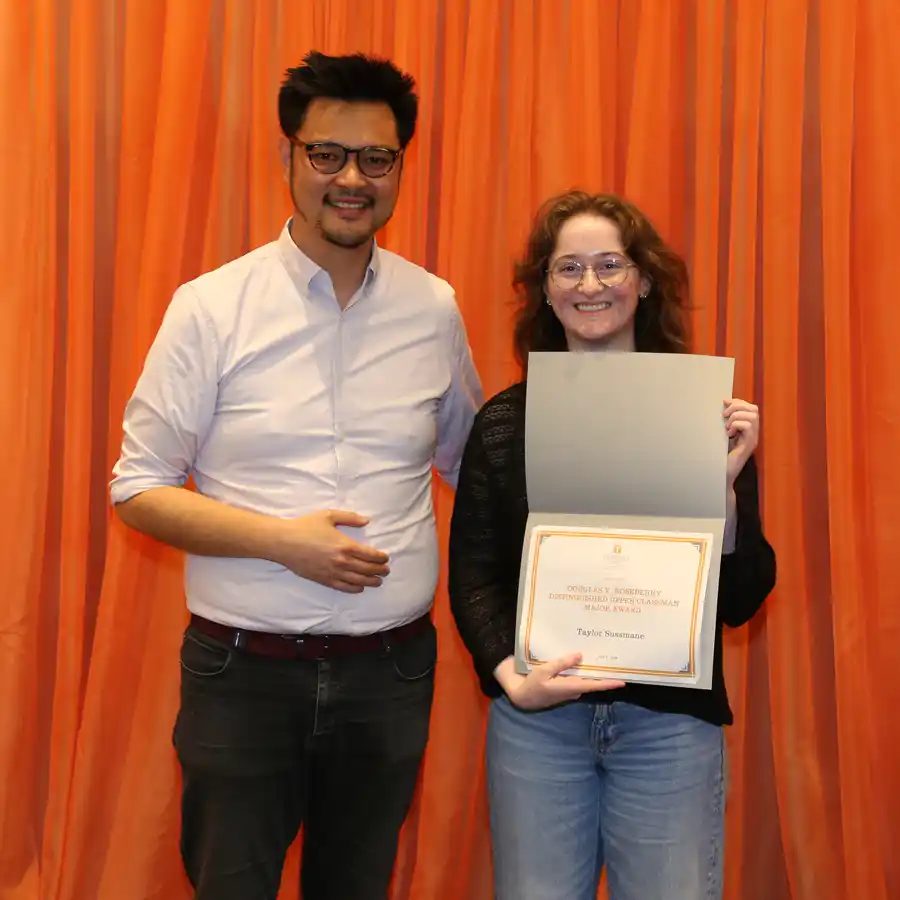
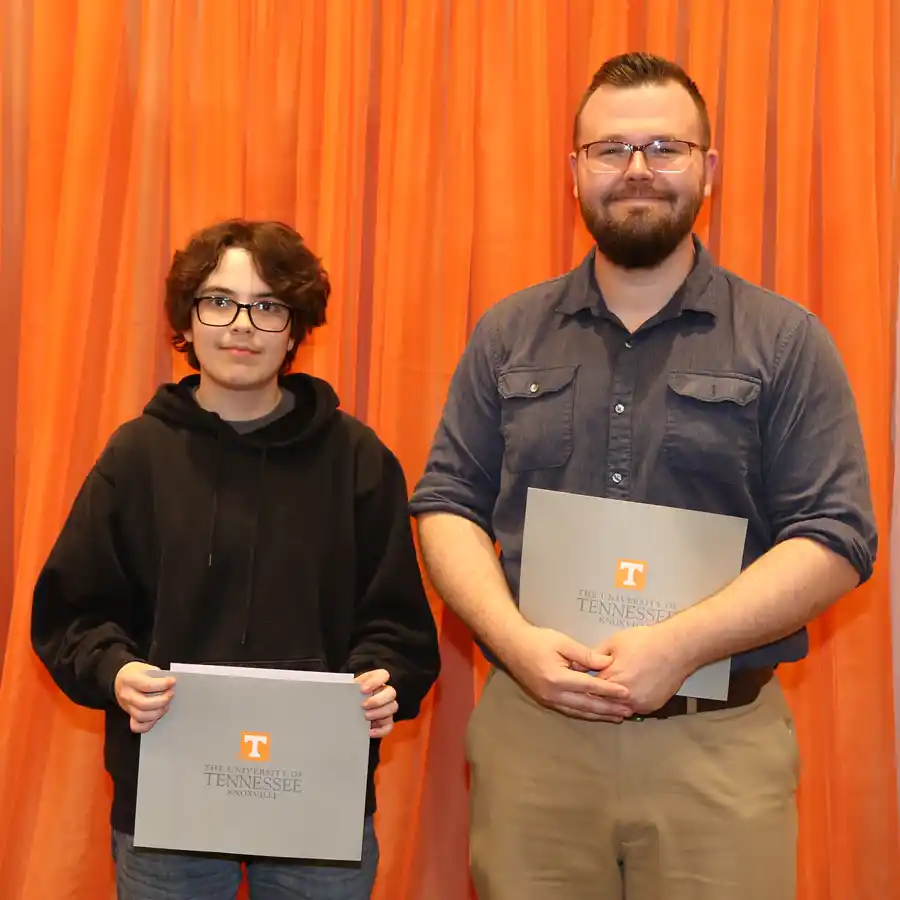
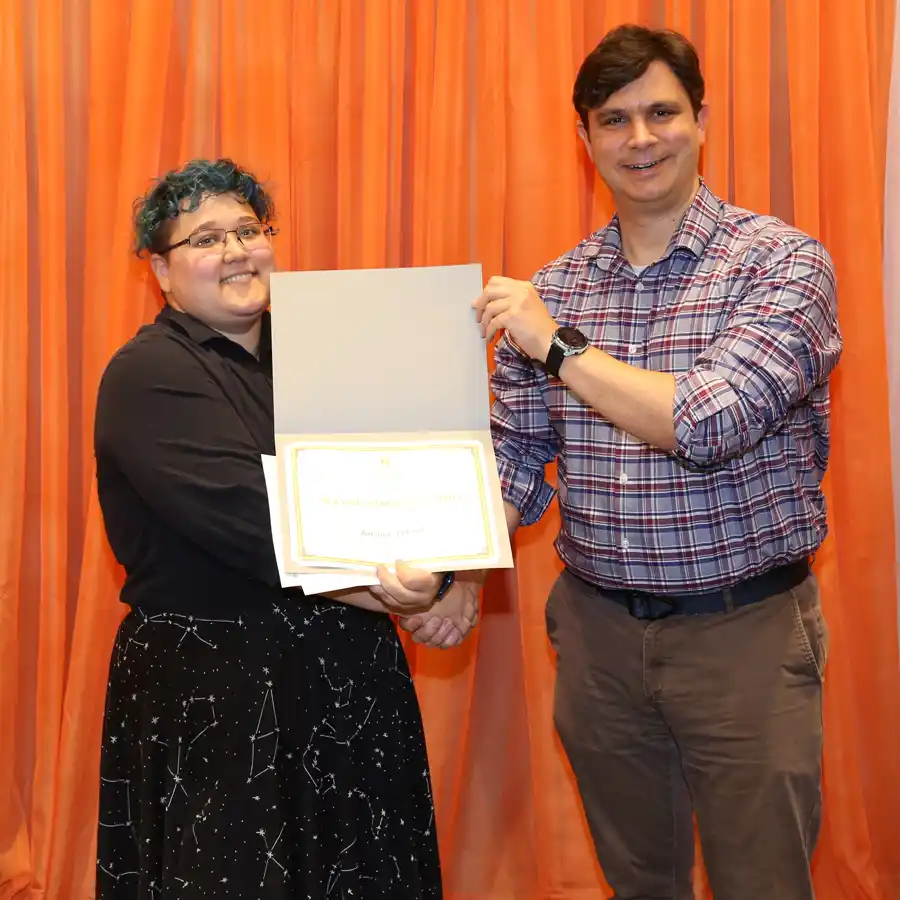
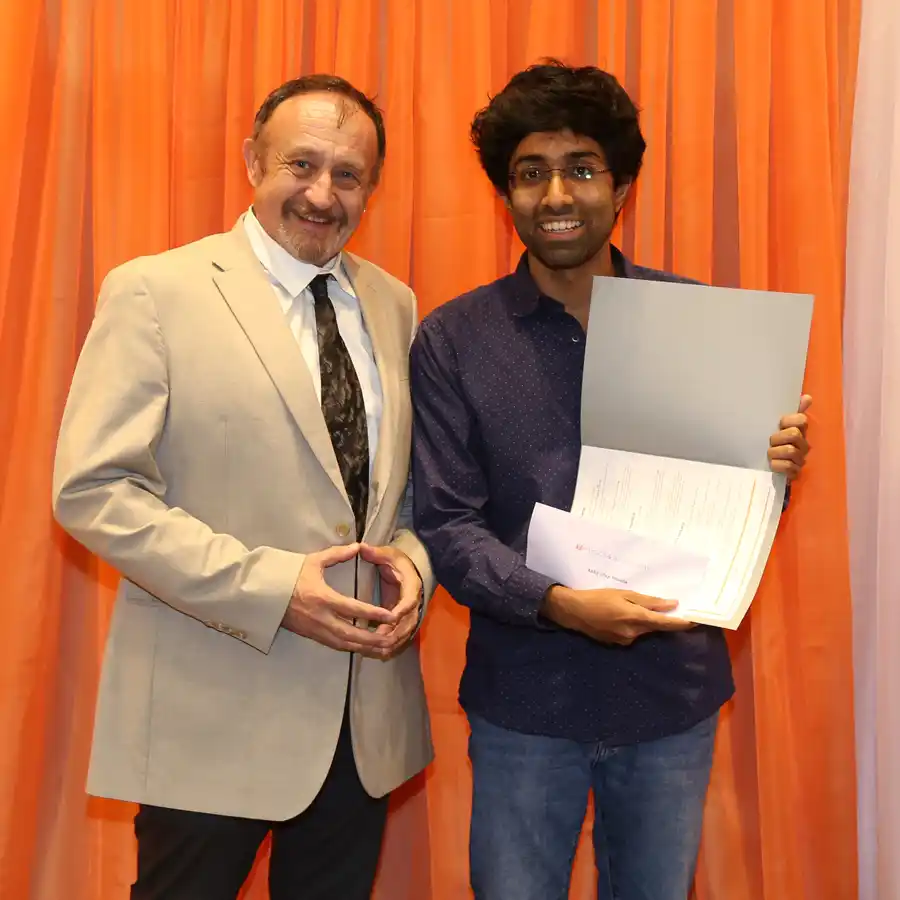
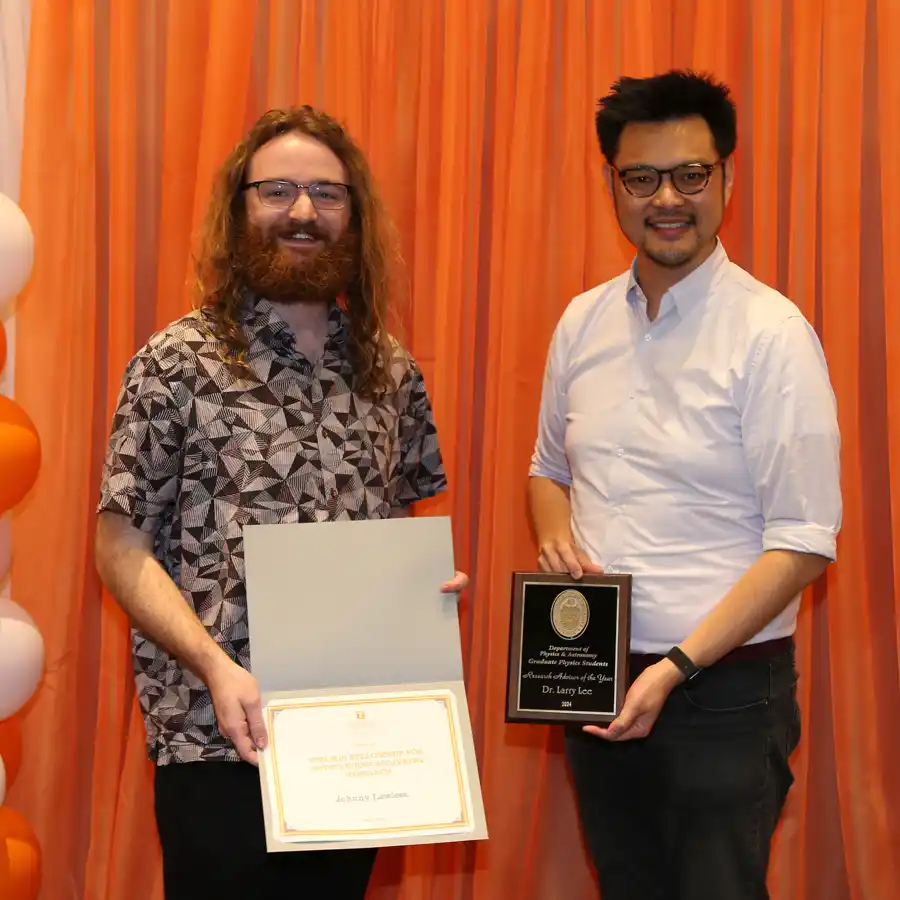
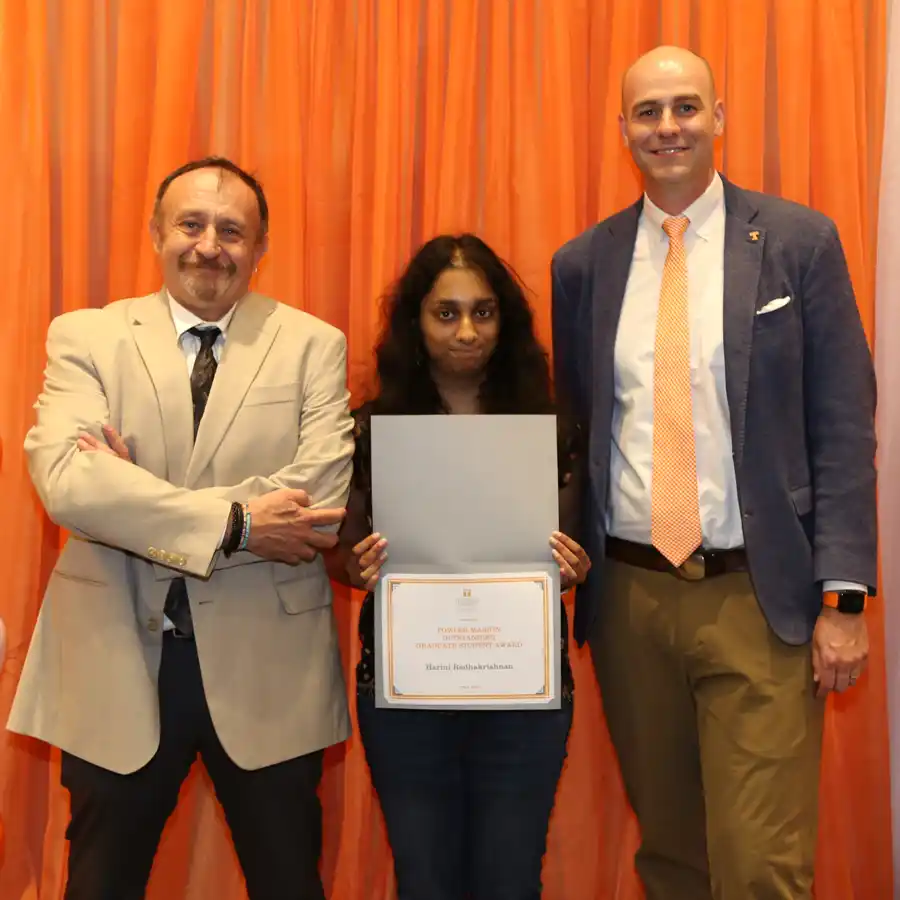
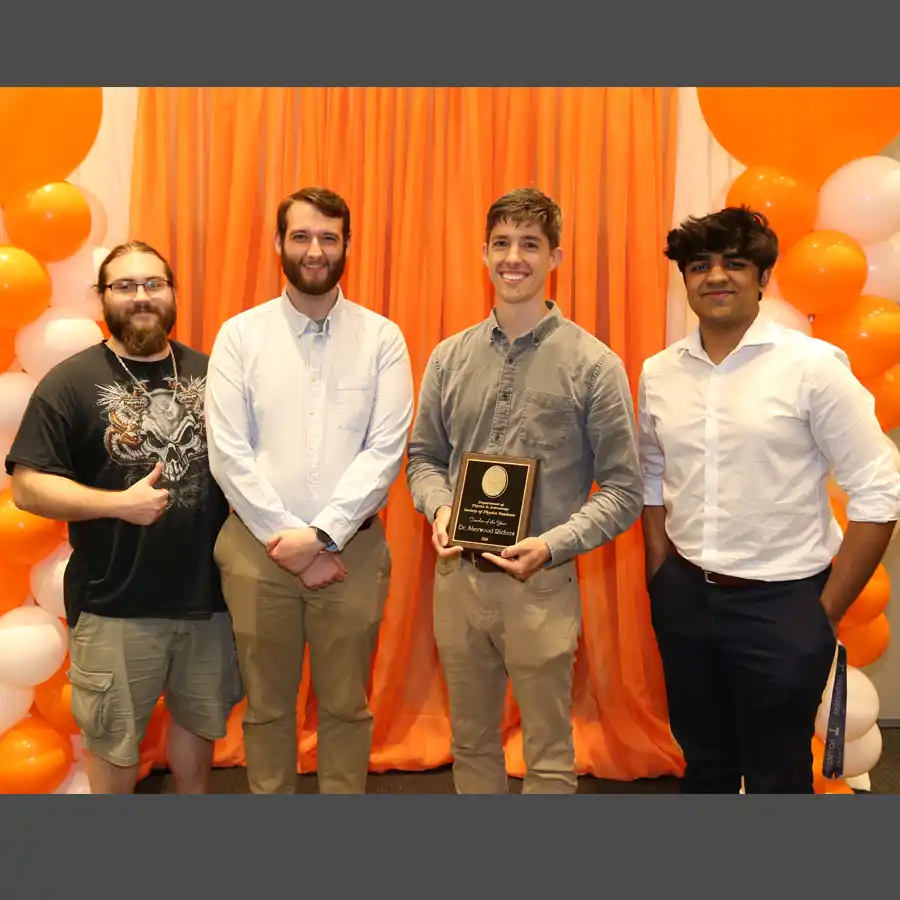
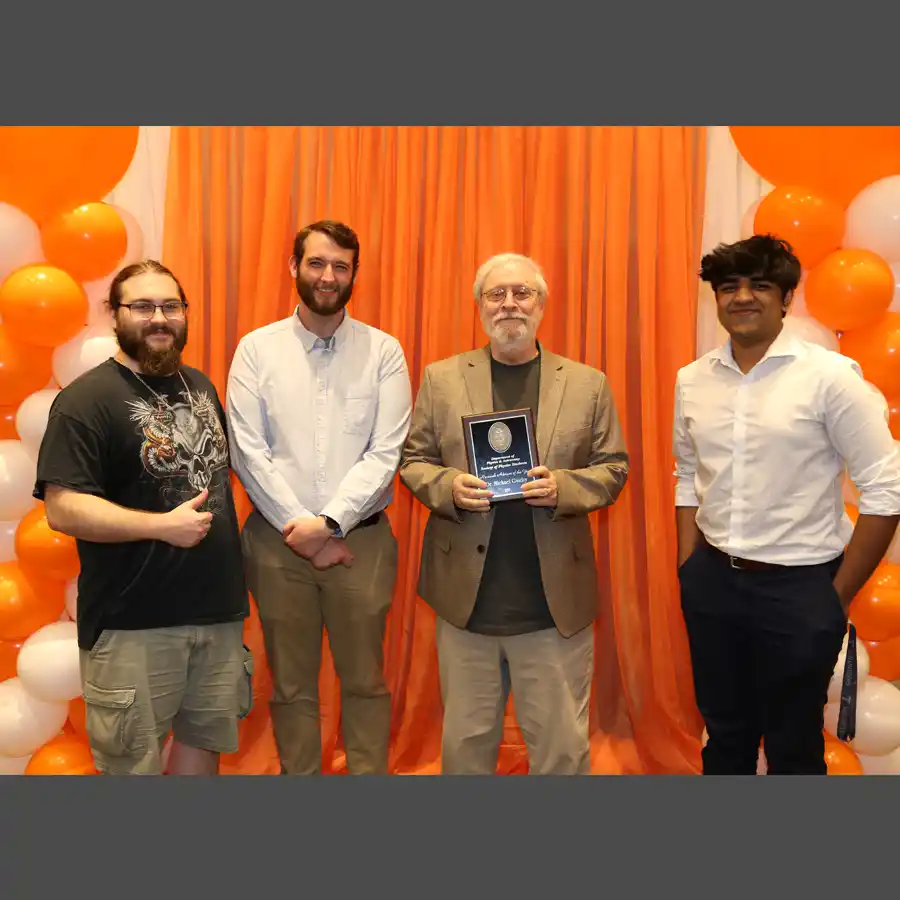
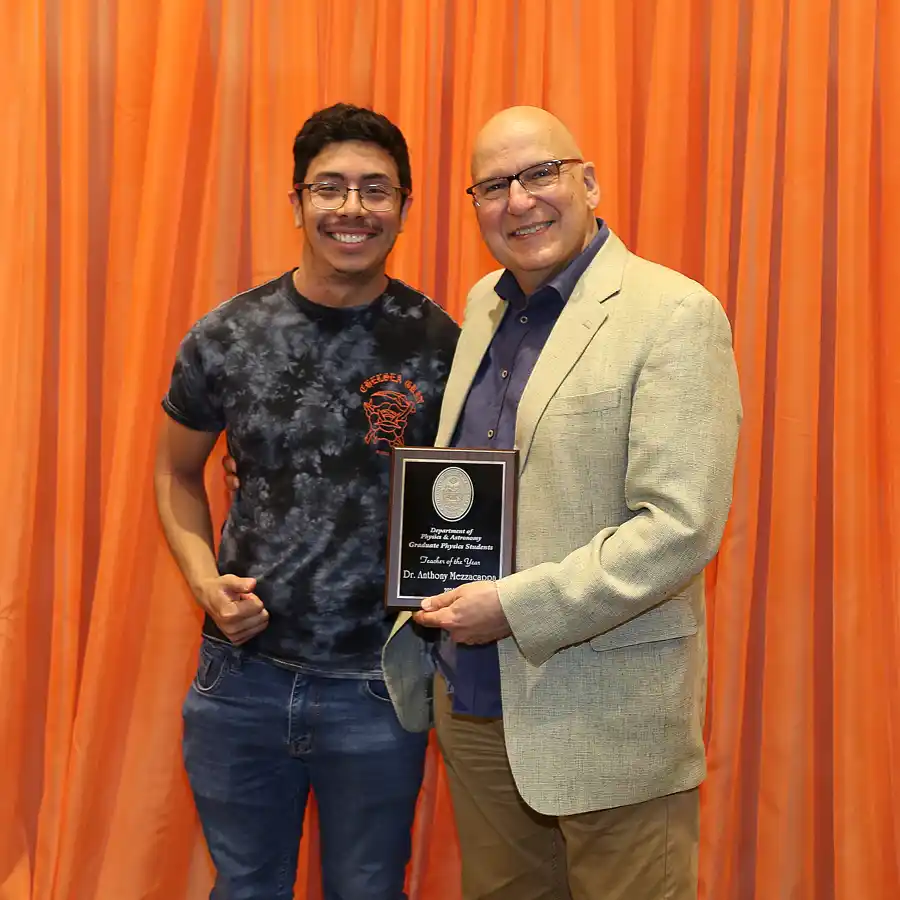
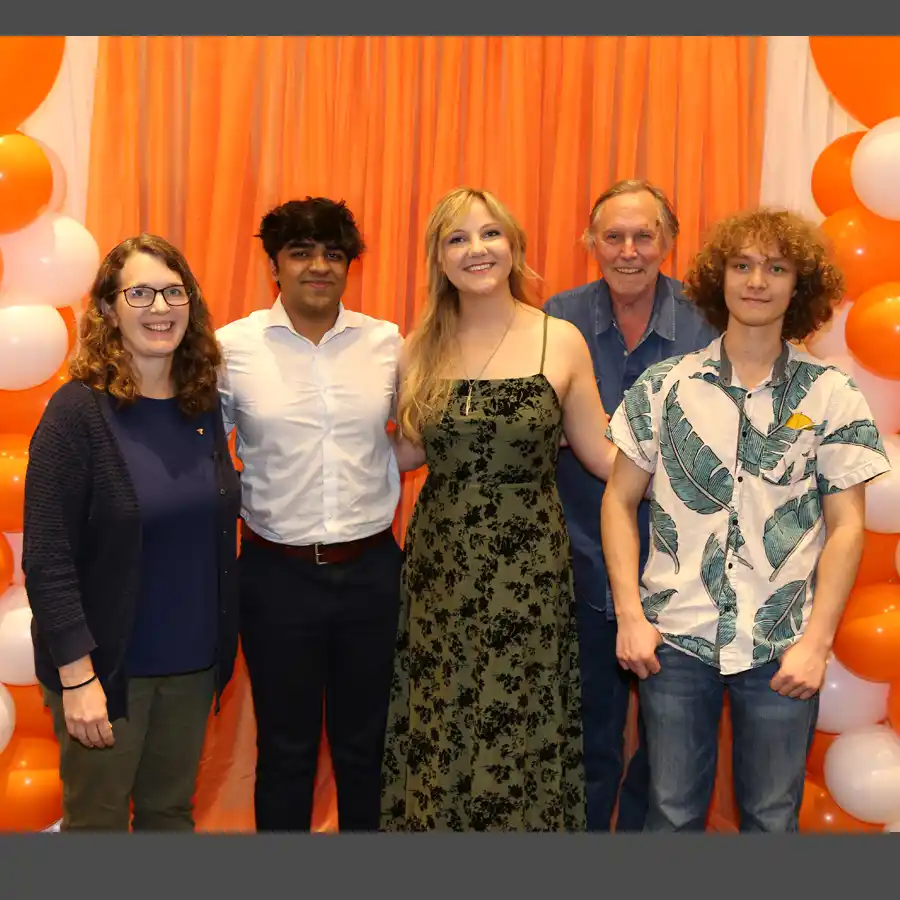
Amanda Nowicki, Hugh Jones, and James Rogers
